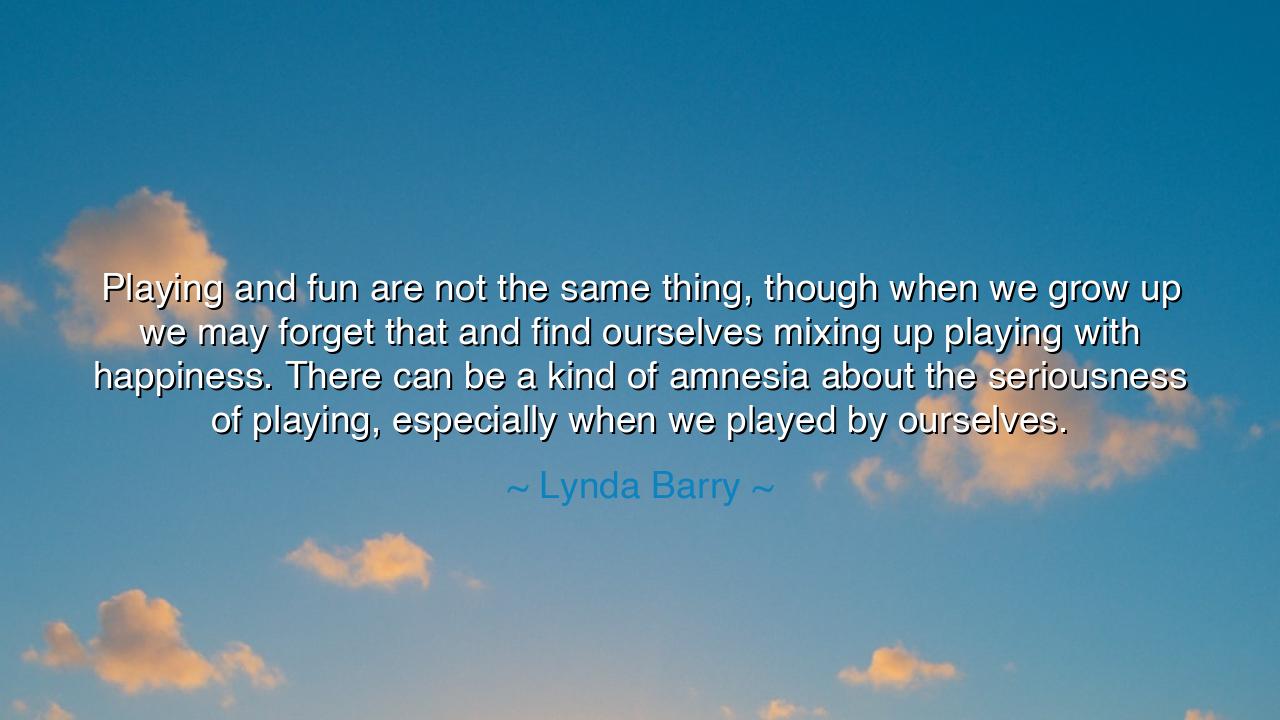
Playing and fun are not the same thing, though when we grow up we
Playing and fun are not the same thing, though when we grow up we may forget that and find ourselves mixing up playing with happiness. There can be a kind of amnesia about the seriousness of playing, especially when we played by ourselves.






Hear the gentle yet profound wisdom of Lynda Barry, the artist and philosopher of imagination, who once wrote: “Playing and fun are not the same thing, though when we grow up we may forget that and find ourselves mixing up playing with happiness. There can be a kind of amnesia about the seriousness of playing, especially when we played by ourselves.” In these words, she reminds us of a truth the heart once knew but the mind has forgotten — that play is not mere frivolity, not simple amusement, but a sacred act of creation. The child at play is not wasting time; they are discovering worlds, shaping thought, and learning the rhythm of their own spirit. Play is the original language of the soul.
The origin of this reflection lies in Barry’s lifelong exploration of creativity and memory. As a writer, cartoonist, and teacher, she has long sought to awaken in others the vitality that adulthood often buries. She observed that as we grow older, we lose touch with the state of wonder that once allowed us to transform a stick into a sword, a patch of dirt into a kingdom. We come to believe that play must be joyful to be worthwhile — yet true play is deeper than joy; it is engagement, imagination, and presence. It is a dialogue between the self and the world, where the mind is wholly absorbed and time ceases to exist.
In her words, Barry mourns the amnesia that settles upon us when we grow older — the forgetting of how serious our playing once was. As children, when we played alone, there was no audience, no reward, no approval — only the intensity of creation. We played to understand ourselves, to feel alive. The stick we wielded was not for laughter alone but for transformation — the power to be something more than we were. Yet in adulthood, we mistake fun for play, believing that pleasure or distraction are its substitutes. We scroll, we consume, we chase happiness — but the deep seriousness of play, the spiritual absorption it once gave us, is gone.
The ancients understood this truth, though they spoke of it differently. Plato said that one can discover more about a person in an hour of play than in a year of conversation. The philosophers and poets of old knew that play is the seed of wisdom, for it awakens curiosity and teaches the harmony between mind and body. Even the gods of myth were said to play — weaving the stars into patterns, shaping mountains and seas with divine delight. For to play is to participate in creation itself. It is an act of freedom and faith, the belief that something can come from nothing.
Consider, too, the story of Albert Einstein, who spoke often of his love for the violin. When asked how he made his great discoveries, he replied, “I play.” It was through this serious play — this blending of curiosity and imagination — that he unlocked the secrets of the universe. He understood that play was not the opposite of work, but the source of it. Likewise, Lynda Barry’s words remind us that the seriousness of playing is not in its laughter, but in its purpose — the creative energy that gives rise to new worlds, new ideas, new ways of being.
When Barry speaks of playing “by ourselves,” she touches the heart of solitude — the quiet arena where imagination is born. As children, solitude did not frighten us; it invited us. Alone, we created entire universes with our minds, finding companionship in our own thoughts. But as adults, we grow afraid of silence and stillness. We fill our lives with noise, entertainment, and distraction, calling them “fun,” but they are hollow echoes of true play. Real play, even in solitude, connects us to something eternal — it restores the dialogue between the child we were and the creator we were meant to become.
Thus, O listener, let this be the lesson passed down to you: Do not confuse fun with play, nor happiness with depth. Seek once more the sacred act of doing something for its own sake — of drawing without purpose, of building without plan, of imagining without fear. In this way, you will rediscover not just joy, but meaning. Play with your hands, your thoughts, your dreams; let creation flow through you as it once did when you were young. For the seriousness of play is the beginning of all art, all wisdom, and all healing.
And so, the words of Lynda Barry stand as both reminder and invocation: “Playing and fun are not the same thing.” To play is to live fully — to engage with life as both artist and witness, to give yourself wholly to the moment without expectation. Rekindle that childlike seriousness within you. Turn from distraction toward creation, from amusement toward meaning. In doing so, you will remember what the child within you never forgot — that in the sacred act of playing, we touch the divine.






AAdministratorAdministrator
Welcome, honored guests. Please leave a comment, we will respond soon